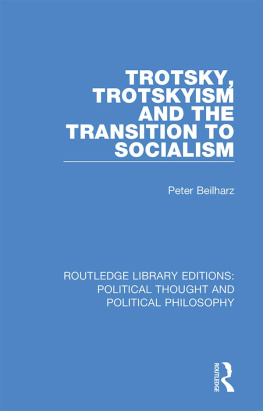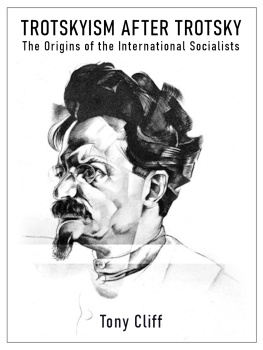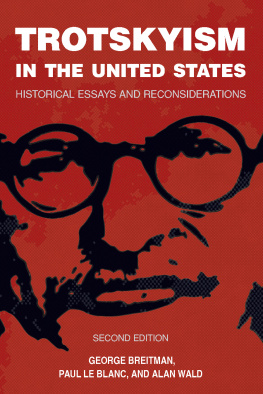Marjorie Pollitt - Defeat of Trotskyism
Here you can read online Marjorie Pollitt - Defeat of Trotskyism full text of the book (entire story) in english for free. Download pdf and epub, get meaning, cover and reviews about this ebook. City: London, year: 1937, publisher: Communist Party of Great Britain, genre: History. Description of the work, (preface) as well as reviews are available. Best literature library LitArk.com created for fans of good reading and offers a wide selection of genres:
Romance novel
Science fiction
Adventure
Detective
Science
History
Home and family
Prose
Art
Politics
Computer
Non-fiction
Religion
Business
Children
Humor
Choose a favorite category and find really read worthwhile books. Enjoy immersion in the world of imagination, feel the emotions of the characters or learn something new for yourself, make an fascinating discovery.

- Book:Defeat of Trotskyism
- Author:
- Publisher:Communist Party of Great Britain
- Genre:
- Year:1937
- City:London
- Rating:5 / 5
- Favourites:Add to favourites
- Your mark:
- 100
- 1
- 2
- 3
- 4
- 5
Defeat of Trotskyism: summary, description and annotation
We offer to read an annotation, description, summary or preface (depends on what the author of the book "Defeat of Trotskyism" wrote himself). If you haven't found the necessary information about the book — write in the comments, we will try to find it.
Defeat of Trotskyism — read online for free the complete book (whole text) full work
Below is the text of the book, divided by pages. System saving the place of the last page read, allows you to conveniently read the book "Defeat of Trotskyism" online for free, without having to search again every time where you left off. Put a bookmark, and you can go to the page where you finished reading at any time.
Font size:
Interval:
Bookmark:
Published by the
Communist Party of Great Britain
16 King Street, W.C.2
5,00022/12/37
Printed by the
MARSTON PRINTING COMPANY
(T.U. throughout)
Nelson Place, Cayton St.,
London, E.C.1
Shall we have peace, or shall war spread further throughout the world? This is the vital issue facing all who profoundly desire peace and progress to-day.
In Spain and China, the fires of war already devour their thousands and tens of thousands.
In Spain it is the fascist Franco, with Blackshirt Mussolini and Brownshirt Hitler at his back, who lays waste the land.
In China, the Japanese fascists sack town and village with a wild brutality which shocks the civilised world.
The British Labour movement and all friends of peace must close their ranks against the onset of the warmongers. They must decide now who are their allies in the cause of peace; they must know and recognise the enemies of peace and progress in whatever guise they appear.
The Man-in-the-Street and his wife, whether they live in Nanking or Madrid, London or New York, Cairo or Tokio, have a stake in peace and none in war. War for them means not profits but death, hunger and suffering. Peace gives the opportunity to strengthen the forces which will reconstruct the world as the people's commonwealth.
One state has already been won by the people. That state is the Union of Socialist Soviet Republics. There, an entire nation devotes itself with clear-sighted courage and tireless energy to building Socialism. To complete its task, the Soviet Union has one paramount needpeace. The Soviet Union is the main bulwark of peace in the field of international politics, both for the reason that war will hold up her magnificent socialist enterprises and because, as a people's state, she recognises her deep responsibilities to the workers of those countries where capitalism has yet to be overthrown.
Therefore, an enemy of the U.S.S.R. is an enemy of British Labour and of all who stand for peace and democracy throughout the world.
Socialism to-day has no more implacable opponent, war no more staunch ally, peace no greater enemy, than Leon Trotsky.
Let British Labour know him, his followers and his actions, for what they area peril to the progress of humanity.
Let British Labour beware of false counsellors who say that the burning differences between Stalin and Trotsky are merely an expression of personal rivalry or a "domestic affair for the Communists to decide."
Only those who do not know the facts can believe such statements. Stalin is leading a great state of 170,000,000 people to the goal for which so many in every country have worked and died. Stalin himself, and the Communist Party, have one supreme duty to the peopleto guide them along the right road, to protect them from wrong policies which can only retard the advance to the new society.
The fight against such wrong policies is in no sense a question of "rivalry" or a "domestic concern of the Communists." It is the concern of the whole people, and especially of the working class in every country, because their own fate is in the balance.
No one in the working-class or progressive movements now believes that the fight against fascism is "a squabble between the fascists and the Communists." They recognise it for what it isa fight by all the progressive sections of society against the forces of barbarism and reaction.
In exactly the same way, the fight against Trotsky and his followers must be recognised as a fight by all the progressive sections of society against those who are attempting to sow disruption and prepare the way for fascism.
It is sometimes asked how it can be possible that such men as Trotsky and his immediate associates have changed so suddenly and completely. Such a question is not necessarily based on opposition to the unmasking of traitors, but upon incomplete knowledge of their past history. It is asked chiefly by people who are not familiar with the history of the Communist Party of the Soviet Union, and who have been deceived by the false statements made by the capitalist press and the Trotskyites alike, that Trotskyism is a new political tendency; that when Lenin was alive, he and Trotsky were inseparable political workers whose views were completely identical, and that it was only after Lenin's death that Trotsky found himself in opposition to the Central Committee of the Communist Party.

Dnieprostroi Hydro-Electric Station.
The first point to be noted is that Trotsky was not one of the "old guard," who, from the very foundation of the Bolshevik Party in 1903 consistently struggled to build up the steeled and disciplined party which eventually led the toiling people to overthrow their oppressors.
On the contrary, from 1903 to 1917 Trotsky was bitterly opposed to the very existence of a disciplined revolutionary Party. Moreover, he directed precisely the same type of virulent, personal invective against Lenin as he does today against Stalin, describing him as the person chiefly responsible for hindering the development of a real revolutionary movement in Russia.
During this period, Trotsky's line had far more in common with Menshevism than with Bolshevism.
The Mensheviks believed that the only possible alternative to the Tsarist autocracy was a republic of the orthodox capitalist type.
Trotsky's theory was that it would be a good thing to start attacking private property, but that immediately this was done, the hostility and resistance of the peasantry would be aroused.
He argued that because the working class is the only class directly interested in winning Socialism, all other sections of the populationpeasants, professional people, small business men and tradersare implacably hostile elements who belong in the same camp as the big capitalists, can never be won over to support the working class, and must always be regarded as enemies to be ruthlessly attacked and exterminated. The only allies which the working class could expect to win, in Trotsky's view, were the workers of other countries; the only really effective assistance they could give would be to bring about the revolutionary overthrow of capitalism in their own countries; and if this was not immediately forthcoming, then the working class was doomed, and would be totally unable to build its Socialist State.
In Trotsky's own words:
"The antagonisms which appear under a workers' government in a backward land where the vast majority of the population is made up of peasants, can only be solved in the international arena, the arena of the proletarian world revolution."
(Preface to "1905.")
or again:
"In the absence of direct State support on the part of the European proletariat, the Russian working class will not be able to keep itself in power and to transform its temporary rule into a stable socialist dictatorship. No doubt as to the truth of this is possible."
("Our Revolution," Russian Edition, Pg. 278.)
or finally:
"A steady rise of socialist economy in Russia will not be possible until after the victory of the proletariat in the leading countries of Europe."
("Collected Works," Vol. 3, Part I, Pgs. 92-93.)
Nothing could be more explicit.
But does this sound like political unanimity with Lenin, whose whole perspective during the years leading up to the revolution of 1917 was the gradual isolation of the main enemy by the winning of section after section of the population to the support of the working classwhose very definition of the dictatorship of the proletariat was "a peculiar form of
Next pageFont size:
Interval:
Bookmark:
Similar books «Defeat of Trotskyism»
Look at similar books to Defeat of Trotskyism. We have selected literature similar in name and meaning in the hope of providing readers with more options to find new, interesting, not yet read works.
Discussion, reviews of the book Defeat of Trotskyism and just readers' own opinions. Leave your comments, write what you think about the work, its meaning or the main characters. Specify what exactly you liked and what you didn't like, and why you think so.







